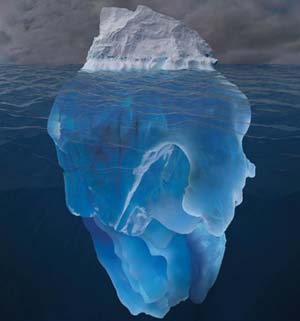 |
 |
| current issue |  |
past issues |  |
send a letter/news |  |
address update |  |
advertise |  |
about us |  |
alumni home |
Campus Currents
|
Big Ice, Up Close
Annette Grace Schloss '90G, '97G on the film "Ice Worlds" By Suki Casanave '86G |
Easy to print version |

|
These days, when the lights dim at the Christa McAuliffe Planetarium in Concord, N.H., audiences might find themselves swooping through the earth's Arctic regions, as well as zooming past the wonders of outer space. But for most of us, the frozen poles seem just about as remote as the stars and planets. "Most people won't ever get to these places," says Annette Grace Schloss '90G, '97G, a research scientist at UNH's Institute for the Study of Earth, Oceans, and Space, who helped create the new 20-minute planetarium film, "Ice Worlds."
"We wanted to give viewers a sense of the majesty and beauty of the Arctic—and the massive amounts of ice we're talking about," says Schloss, who worked with colleagues Mark Fahnestock, Richard Lammers and Jonathan Pundsack on the $1.2 million National Science Foundation-funded project, a joint effort between UNH, the Houston Museum of Natural Science and the digital theater show producer Evans & Sutherland Corp.
In one image, the camera pulls back from a massive floating iceberg—only to reveal that the looming, jagged sculpture is, literally, only the tip of the iceberg. Seventy-five percent of the ice is actually below the surface. Filmmakers reconstructed this underwater portion by measuring and taking photographs of real icebergs that have flipped over. The film's animated digital photography educates viewers about the importance of ice, both on Earth and throughout the solar system. "Studies of these ice worlds both near and far," says the voice of the film's narrator, actress Emily Watson, "will help us understand our own planet, which is more dependent on ice than we realize."
"Ice Worlds," which can also be viewed on portable domes in school settings, comes with teacher kits, cleverly packaged in insulated tote bags, that help educators bring the "Ice Worlds" experience back to their classrooms. The film's release coincides with the 4th International Polar Year, a worldwide undertaking that involves thousands of scientists from more than 60 nations in a comprehensive study of both poles. To view a trailer, see http://iceplanetearth.org/.
blog comments powered by Disqus
